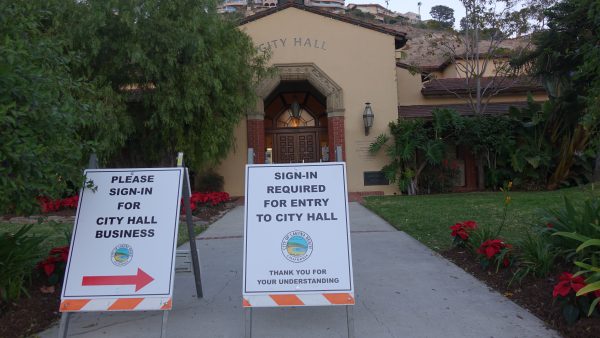
By Breeana Greenberg, Special to the Independent
Laguna Beach officials pushed back against the Orange County District Attorney’s findings of Brown Act violations surrounding a closed session meeting, according to a letter sent by the City Attorney Wednesday.
The letter signed by City Attorney Phil Kohn was authorized by the Laguna Beach City Council during a special closed session meeting on Tuesday. The City Council voted 3-2, with Councilmembers Toni Iseman and George Weiss dissenting. The letter explains some of the circumstances of the controversial June 29 closed session meeting as well as an invitation to meet with the District Attorney to discuss potential remediation measures.
“The City regrets not having been afforded the opportunity to provide context and an explanation for the closed session item as it is believed that your assessment relied on incomplete and/or inaccurate information,” Kohn wrote.
Kohn noted that some councilmembers feel that the District Attorney’s evaluation was based largely on Weiss’ complaint. Other councilmembers, City Manager Shohreh Dupuis, and Kohn were not contacted by the District Attorney prior to the City’s receipt of the District Attorney’s findings, Kohn wrote.
A district attorney spokesperson said Friday that prosecutors will meet with Kohn and Dupuis.
The Orange County District Attorney’s Office found significant evidence that Laguna Beach city councilmembers violated the Brown Act during a June 29 closed session discussion of Hotel Laguna and subsequent leaks that Weiss has defended.
In a Sept. 23 letter, Senior Deputy District Attorney Steven Schriver claimed there’s “substantial evidence” councilmembers failed to properly notify the public of the closed session and scope of the item discussed in the meeting. Schriver also noted that Weiss potentially violated the Brown Act by disclosing confidential information with the public. Weiss has admitted to sharing confidential information about Hotel Laguna’s stop-work order with environmental advocate Mark Fudge and former mayor Paul Freeman.
“Well, I think it’s a victory for transparency,” Weiss said. “I unfortunately don’t necessarily like the circumstances under which that’s achieved, but it’s a good thing.”
Violations of the Brown Act undermine government transparency and citizen’s faith in their government’s legislative process, Schriver wrote in the letter.
“I take responsibility for what I did, but I didn’t violate the Brown Act,” Weiss said. “When I couldn’t get an answer about what happened in closed session in follow up emails on the renovation of Hotel Laguna, or, an explanation of why the Planning Commission, Coastal Commission wouldn’t review this stuff, I had to go out and look to ask people, but my talking to those people didn’t actually violate the Brown Act because it wasn’t a protected topic.”
Weiss explained that the city council closed session agenda on June 29 listed the item as discussion of litigation regarding Hotel Laguna.
“But instead, litigation was never discussed and it was just all about what was happening at the hotel and then taking a vote to rescind the stop work orders,” Weiss said. “So that isn’t protected, if anything in the closed door session is not under the protected list, and on the agenda then it’s public information.”
“When permitted, closed session proceedings are endowed with the privilege of confidentiality,” Schriver wrote. “This allows attendees to speak with candor, debate freely, and gather necessary information without risk of public reprobation.”
The letter outlines safeguards that City Council is required to follow in order to prevent future public meeting law violations to avoid further action by prosecutors:
- The City Council must properly notice and conduct closed session meetings
- Record its closed sessions for six months
- Retain those recordings for one year
Prior to receipt of the letter from the District Attorney’s office, Kohn explained that he, Dupuis, and Mayor Bob Whalen discussed “additional safeguards to ensure more robust compliance with the provisions of the Brown Act.”
The City plans to expand description of closed session items and include a preamble to be read at the start of a closed session meeting. The preamble will remind councilmembers that discussion during closed session must be limited to the scope authorized by the Brown Act and remind councilmembers that closed session discussions are confidential. The preamble will also invite councilmembers to express concern with any closed session items pertaining to the Brown Act and offer the opportunity for councilmembers to remove themselves from the closed session if council continues to discuss the item.
“I think it’s a turning point for the city. It’s an opportunity to examine the way we do business,” Iseman said in a phone interview Wednesday.
Laguna Beach resident Mark Fudge said Friday that more needed to be done to improve trust and transparency at city hall. Fudge hosted the meeting where Weiss shared confidential information.
“It’s a good start, but it doesn’t solve the problem,” Fudge said. “And the problem is that the City made decisions in the dark of the night behind closed doors, shutting the public out from participation. And then proceeded with those plans and permits for a hotel to open. And right now the District Attorney didn’t suggest that we reverse this process, just said that there’s substantial evidence of it, and they won’t go any further, if everyone follows the rules.”
Weiss felt that the OCDA letter noting that the closed session may have violated the Brown Act will help improve transparency.
“I think this is good news for the city, good news for the residents,” Weiss said. “I ran on a platform to provide more transparency to how the city operates and clearly this identifies issues related to that that have to be addressed. Hopefully we can work as a better city council and work more collaboratively than we’ve been over the last year.”
Michael Jenkins, a lecturer at the USC Gould School of law and long-time contracted city attorney for several municipalities including West Hollywood and Hermosa Beach, said district attorneys usually get involved in response to a complaint from a member of the public. It is not uncommon for the DA to transmit a letter like to cities they’re investigating, which usually results in a reply from the city.
“The DA will then decide what to do – it can drop the matter, issue a caution or proceed with a formal proceeding, such as a civil or criminal prosecution,” Jenkins said. “Criminal prosecutions are rare and the burden of proof is high.”
Daniel Langhorne contributed reporting to this story.





When you are in a hole, stop digging. Stop assuming that citizens of this City are fools.
https://www.lagunabeachindy.com/letter-open-public-meetings/
Google search results for Laguna Beach Independent:
“skate park” – 36
“lawsuit” – 298
“brown act” – 555